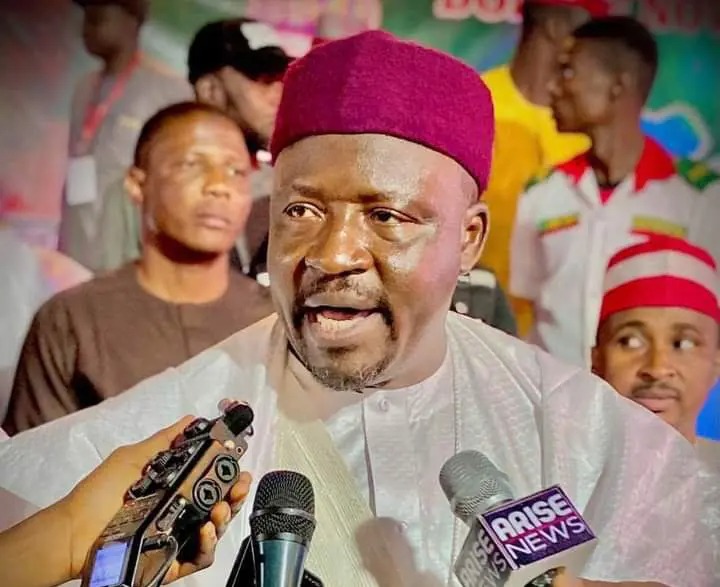Senator Kawu Sumaila’s Defection from NNPP to APC: A Shift in Kano’s Political Landscape
The political landscape of Kano State experienced a significant shift on Wednesday, August 30, 2023, with the official confirmation of Senator Kawu Sumaila’s defection from the New Nigeria People’s Party (NNPP) to the ruling All Progressives Congress (APC). Sumaila, the lawmaker representing Kano South Senatorial District, put an end to weeks of speculation surrounding his political future by releasing a statement on his Facebook page, unequivocally stating his return to the APC. He attributed his decision to the paramount importance of serving his constituents, emphasizing their welfare as his primary motivation. This move has sent ripples through the political scene, raising questions about the stability of the NNPP in Kano and sparking further conjectures regarding the potential return of former NNPP presidential candidate, Rabiu Kwankwaso, to the APC. Sumaila’s defection underscores the dynamic and often unpredictable nature of Nigerian politics, where allegiances can shift rapidly and individual ambitions frequently intersect with broader party strategies.
Sumaila’s Rationale: Prioritizing Constituents’ Needs and Local Politics
In his statement, Senator Sumaila explicitly framed his decision as a move driven by his commitment to the well-being of his constituents. He stressed that "all politics is local," emphasizing the importance of representing the interests and addressing the needs of the people he serves. This rationale resonates with a common theme in Nigerian politics, where politicians often justify party affiliations and political maneuvers by highlighting their dedication to their local constituencies. Sumaila’s statement suggests that he believes his ability to effectively advocate for his constituents is better served within the APC, implying a potential disconnect between his political objectives and the NNPP’s direction. This focus on local politics highlights the significance of constituency-level dynamics in shaping national political alignments and underscores the importance of understanding the localized factors influencing political decision-making.
Implications for the NNPP and Kwankwaso’s Future
Sumaila’s departure from the NNPP is a significant blow to the party, particularly in Kano State, where it holds considerable influence. The timing of the defection, shortly after the NNPP’s unsuccessful presidential bid, raises questions about the party’s ability to retain its members and maintain its momentum. Furthermore, speculation is rife about the potential return of NNPP leader and former presidential candidate, Rabiu Kwankwaso, to the APC. Sumaila’s move has fueled these rumors, as he is considered a close ally of Kwankwaso. While no official confirmation has been made regarding Kwankwaso’s future political plans, Sumaila’s defection adds to the uncertainty surrounding the NNPP’s leadership and overall trajectory in the Nigerian political landscape.
Connection to National Political Developments and the Delta State Defections
Sumaila’s defection to the APC coincides with other significant political realignments, notably the defection of Delta State Governor Sheriff Oborevwori and former PDP Vice Presidential candidate Ifeanyi Okowa, along with the entire PDP state structure in Delta, to the ruling party. These concurrent defections highlight a broader trend of political fluidity and the growing influence of the APC. The timing of these events suggests a potential orchestrated effort by the APC to consolidate its power and expand its reach across the country. These developmentsunderscore the ongoing power dynamics within the Nigerian political system and the strategic maneuvering employed by political actors vying for influence and control.
The Significance of Defections in Nigerian Politics
Defections are a recurring feature of Nigerian politics, often reflecting shifting power dynamics, personal ambitions, and strategic calculations. They can have profound consequences, reshaping political landscapes, influencing electoral outcomes, and contributing to the overall instability of the party system. While defections can be driven by genuine ideological differences or policy disagreements, they are frequently motivated by personal gain, access to resources, or a desire to align with the ruling party. Sumaila’s defection, alongside the high-profile defections in Delta State, serves as a reminder of the fluidity of party affiliations in Nigeria and the ongoing realignments shaping the political arena.
Looking Ahead: Potential Impacts and Future Political Developments
The long-term implications of Sumaila’s defection and the broader trend of political realignments remain to be seen. These developments are likely to have a significant impact on the upcoming gubernatorial elections in Kano State and other parts of the country. They could also influence the balance of power in the National Assembly and shape the dynamics of future political negotiations. The continued fluidity of party affiliations underscores the need for close monitoring of evolving political alliances and the potential impact on the Nigerian political landscape. As the political scene continues to evolve, understanding the motivations behind these defections and their broader implications will be crucial for navigating the complexities of Nigerian politics.


